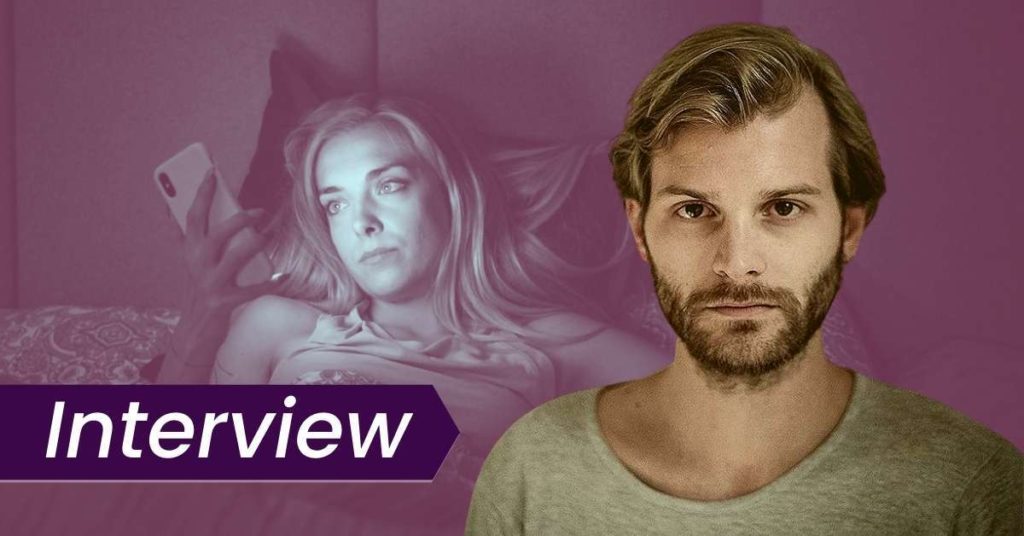At the International Film Festival Rotterdam, we caught up with Magnus von Horn, writer-director of Sweat, who spoke about making one of the first great films about an influencer.
Read our TIFF review of Sweat.

Discover one film you didn’t know you needed:
Not in the zeitgeist. Not pushed by streamers.
But still easy to find — and worth sitting with.
And a guide to help you do just that.
If you’re on social media, then you probably interact with professional influencers every day — yet very few films explore the psychology of an influencer. Perhaps that’s because it’s a relatively new job, younger than social media itself, and one that people have a tendency not to take seriously. Watching Sweat at TIFF last year felt like a revelation (read my TIFF review). It was the first film I’d seen about an influencer that treated her with compassion, psychological complexity, and didn’t dismiss her as shallow or comical.
When I spoke to writer-director Magnus von Horn, he admitted that he shared the same frustrations about how influencers were depicted in pop culture, and sought to create a portrait of an influencer that was more true to life. “The narrative of following her feed became more interesting than most movies,” he said. “It was so much everyday nothingness, and then suddenly, an emotional breakdown. And then a return to going out and walking the dog and making a meal.”
Creating a portrait of an influencer, who is adored by her followers but still unshakably lonely, also subconsciously appealed to von Horn as a thematic extension of his first film, The Here After. Von Horn told me that he “wanted to make something completely different” for Sweat, his second feature. But even though he “packaged it in a very different form, and everything about the way [he] worked was different, in the end, it’s the same film. It’s about the same things.” The Here After, which we raved about at TIFF 2015, is about John, a teenager who tries to reintegrate with his town after a stint in a juvenile detention centre, but who finds himself ostracised and isolated by his hostile community.
Fitness influencer Sylwia (Magdalena Kolesnik) in Sweat has a very different life from John — she lives in Warsaw, not rural Sweden, and she’s adored rather than hated — but both of them are lonely and unhappy because they’re scrutinised by everyone around them. Over the course of three days, Sylwia grapples with relationships, stalkers, sponsors, and her own loneliness. We meet her after a particularly rough night, when she posted on Instagram a video of herself crying about how she feels lonely. Now, the morning after, she manages the fallout: fans reaching out, and one of her sponsors expressing concerns that their product will be associated with emotional instability. We get to know the serious, focused, put-together version of Sylwia behind closed doors, and the enthusiastic, sunny version of Sylwia that she performs on her Instagram feed, and in public appearances.
The film is also smart about the toxic nature of parasocial relationships, where Sylwia’s fans feel like they know her, even though they’re strangers to Sylwia. “She shares so much from her life, so people start thinking that they can share the same with her, whenever they see her,” mused von Horn. We see this in her interactions with two fans: one a female acquaintance who pours her heart out to an Sylwia, telling her about her miscarriage; the other, a mentally unstable male fan who parks his car outside Sylwia’s apartment and masturbates whenever he sees her. These uncomfortable but provocative encounters cause Sylwia to rethink her relationship to her job, building to a climax that’s either triumphant or ominous, depending on how cynical you are about social media.
I spoke to Magnus von Horn after Sweat’s online screening at the International Film Festival Rotterdam. He spoke about why he wanted to make a film about an influencer, casting lead actress Magdalena Kolesnik, and the importance of empathy in storytelling.

Seventh Row (7R): What drew you to making a film about an influencer?
Magnus von Horn: There were a lot of factors. I wanted to make a film that was very different from my previous film [The Here After]. And I wanted to make something that was very contemporary and fast moving. I think the influencer thing was a bit of a dare [I set myself]. I was spending a lot of hours on my phone on Snapchat, and I came across a fitness influencer. I couldn’t stop watching the daily posts this fitness influencer was making. It fascinated me. I was like, “Can this be a movie? How do I write this character and tell a story about her in a way that I want?”
On an emotional level, I was kind of provoked by the way she used her platform. There are so many followers, and at first, I felt the content was so shallow and banal. But that’s also what I liked about it. Eventually, I found myself feeling jealous of this ability to be able to post so much and to share your life, not only in important moments, but in its normality. The narrative of following her feed became more interesting than most movies, because it was so much everyday nothingness, and then suddenly, an emotional breakdown. And then a return to going out and walking the dog and making a meal. It becomes like a portrait.
I gained more and more respect [for the influencer] the more I started questioning myself: why am I watching this? It’s creating so many emotions within me that go, “This is bullshit. This is shallow.” But that’s just me. I guessed it would be similar for an audience if she’s in a movie.
7R: I find films about influencers so interesting, because influencers are a relatively new thing, and so there isn’t really a cinematic tradition of how they’re depicted on screen. Often, the films about influencers that do exist portray them as shallow. Were there any cliches or misconceptions you wanted to avoid?
Magnus von Horn: I felt the same. [Influencers are] everywhere. And everywhere, everyone is on their phone. Everyone knows everything about influencers, yet there are no films about them. It’s such a contemporary and kind of controversial character, this new job that we have. We have problems portraying them as people. They have to have a meaning, or they have to become gimmicks, or you have to have an ironic look at them. Or they become elements of a stupid comedy or horror.
Why aren’t there more characters like this in film today, since it’s so present around us? In the ones that are being made, they’re being laughed at. It’s so easy to laugh at it. And it’s always really annoying to laugh at something that is easy to laugh at. For me, it was a really nice challenge. It gave me more energy to want to do something nice with it, since it’s, for some reason, not being taken seriously in the world.
7R: How did you cast your lead actress, Magdalena Kolesnik, and work with her to build the character of Sylwia?
Magnus von Horn: She was the first person who came into the casting room. But it still took maybe four months before I gave her the part. I had her come back many times. I felt quite quickly that she was right for the part, but since this is only my second feature film, I wanted to spend so much time on the casting. It would be too weird if it was the first person [who auditioned] that got the part.
She didn’t even have Instagram at the time when she came for castings. She had very little contact with how the work of an influencer looks. She prepared for the part for one-and-a-half years, more or less, from going to the gym a lot to getting used to working on social media. We had problems financing the film, so we had a lot of time. That time [involved] regular meetings and slowly getting into this character.
Magdalena Kolesnik, the actress, needed to find how she’s connected to Sylwia, maybe not on the surface, but inside. When we got to the film, we knew exactly what they shared and what is true to them both. The goal is that, by the last scene of the film [when Sylwia gives a passionate and personal speech on a talk show], they should speak the same language. What Sylwia says at the end of the film is also what Magdalena the actress wants to say. It’s also what I, as a director, want to say. It rings true because it can ring as a cliche, as well, of course, and that’s what I like about it.
7R: Did you do any rehearsals with Magdalena?
Magnus von Horn: Yeah, a lot. But it was more like playing games, bringing a camera along, and just getting into a way of shooting the scene. It was about finding a way to work and how to approach the film, both with camera and with the acting.
It ended up being a very mobile camera, with very long takes, and acting that is never really the same [between takes] and that is not precise. It’s precise in its emotion, but it’s not precise on hitting marks. The camera also often shoots the whole scene in one shot.
We thought that the camera should be like a dog that is really trusting of its master, which is Sylwia, and who will never get angry or bite her. It’s a bit stupid and will jump up and lick her face, be very close, and cross boundaries. If you push the dog away, it needs to come back.
[During] shooting, since we did so many rehearsals, I [didn’t have] to direct much anymore. If I start to try to direct the camera, and tell [the camera operator] where the camera should look at certain moments, I destroy their intuition: the operator starts thinking, and his intuition is better than his thinking. The same goes for Magdalena. Her intuition knows what to do, because she knows her character. When I go in and make detailed changes, I often just ruin the scene.
7R: So when you are rehearsing scenes with Magdalena, you also had cinematographer Michal Dymek in the room?
Magnus von Horn: Yes, always. And we shot a lot of things, just on the street outside, or in cars. I would act against her. A lot of the time it was just really having fun.
[Magdalena] was always with us, as well, when we were casting the other parts. That also gave us free rehearsals. For example, when we were casting the guy [who masturbates in Sylwia’s apartment], we always did this masturbation in her apartment scene. We did that, I don’t know how many times, with different people. It almost took the freshness away from it, which was a bit of a problem. But then we had to find it again. The scene also opened up and developed so much because of that,
7R: Did your conception of Sylwia as a character change much when you’d cast Magdalena? How much did the script change over that year and a half of prep and rehearsals?
Magnus von Horn: The script didn’t change so much, but a lot of details, and maybe the dialogue, changed a lot, especially what she says in the end. But it was more like my image of her changed, because when Magda was cast for the film, it’s Magda’s version of Sylwia that will end up on the screen and not my version. It’s not like I decide on her so that she can adapt to my idea. I want to take everything that she has. I like her for that.
I knew at the beginning of developing this story, I had a film idea about a fitness influencer who has made her whole career on a lie, is about to be caught in that lie, and kills the person who is about to expose her. A completely crazy thriller with lots of extreme, sensational things. Not at all what it turned out to be. But then, working with the project and developing the character, I’m able to take away all the sensational stuff, because I realized the character is more interesting than these attractive plot points. I ended up taking it all away, and in the end, it just becomes three quite normal days.
7R: I really loved the first scene where Sylwia leads a workout in a shopping mall. We instantly see the dichotomy of Sylwia as a focused businesswoman behind the scenes, preparing to go on stage, and then as an energised performer in front of the crowd.
Magnus von Horn: I wanted it to be a bit of a religious experience. I knew I wanted a really good, crazy meeting between her and her fans, where all the goodness comes out. It’s just good energy between them, really. But since it’s such a strange profession. They all kind of look a bit crazy because of the place they are in.
It creates so many meanings for the audience, but I don’t have to make them because it’s already provocative for one-hundred sweaty girls of all different bodies and ages to be hugging and screaming and taking selfies in a shopping mall. They feel kind of reborn because of the fitness influencer on stage, and that group energy is amazing. That’s what I wanted to do [for the first scene]. I’m all about empathy, and for me, that scene is completely empathy, and a lot of love, and good feelings.

7R: Both of your films have been about someone who’s isolated, under public scrutiny, and seeking connection. What draws you to these kinds of stories?
Magnus von Horn: I don’t really know, but I’m very aware of it. With Sweat, I wanted to make something completely different [from The Here After]. I packaged it in a very different form, and everything about the way I worked was different, but in the end, I think it’s the same film. It’s about the same things, just like what you were saying. I don’t know why that is, and I honestly don’t care to find out. I could probably go to therapy and discover all those secrets, but then they stop being secrets, and I start understanding them better, and I think I will lose something. Or maybe I’m just scared. I think it’s also fascinating that it ends up being about the same thing. Maybe with this new film I’m developing, it’s happening again. (laughs) So I guess it will repeat itself!
7R: You talked about the importance of gaining audience empathy. How do you go about that?
Magnus von Horn: It’s just about treating the character as a human being, both the good and the bad. Of course, filmmaking is manipulation, but if you show a character as a human, then you stop treating the character as a victim or a perpetrator. If you can love your character, then you will love the good and the bad. I’m really attracted to the dark side, but also to the good side. I like both.
It takes a long time, in [the process of writing] a script, to dare to treat someone just as a human being, and not to push them in the direction you want the story to go. It takes a long time to get to the point where you can’t cheat your characters anymore. For a long time, in the beginning of writing, when I try to put the film together, I feel like I’m cheating in how I push characters to do things that they wouldn’t normally do, because I want to tell a story. But the real story happens when the characters are free to do what they want. And then suddenly, maybe they’re not so sympathetic at moments when you want them to be. And suddenly, maybe they are really sympathetic when they shouldn’t be, just like in real life.
7R: The film is very bright and colourful and inviting even though it’s sometimes thematically dark. There’s a lot of pink. How did you think about what the film was going to look like?
Magnus von Horn: It was about taking everything from that world and really loving it — to not try to make the world of shopping malls beautiful, just to take them as they are. And to take the colours as they are. To not try to make that word different from what it is and what it looks like.
That becomes a strength, as well, because the more of a pink, blonde fitness girl she is in the beginning, the more of a stereotype we play with, which is interesting. If we choose fake nails, let’s make them long; let’s make them scream. Let’s make hair extensions. Let’s do spray tan. Let’s do everything. Let’s use all the tools in this world to the limit.
7R: I found the portrayal of Sylwia’s fans really interesting, from the woman who approaches her in the shopping mall to the guy who masturbates to her in his car. They’re very invasive, but then you get drawn into their lives, and Sylwia does, too.
Magnus von Horn: The scene in the shopping mall with the friend who had a miscarriage was, I think, the first scene I wrote. Everybody knows these situations, when you meet someone who you haven’t seen for a while, or you don’t know that well. They become vampires, and they invite you to do something or tell you something that you don’t want to hear but you have to listen. And then they leave you, and you have all this vomit all over you, and you have to live with that.
[Sylwia] shares so much from her life, so people start thinking that they can share the same with her, whenever they see her. I met an influencer [after having] followed her for a while. When I saw her in real life it was very strange for me, but she doesn’t get [that same strange feeling] when she sees me for the first time. That difference is very strong. And I think with this stalker in the car, he’s able to see beyond her or to feel that they share the same kind of problem. It’s very provocative for Sylwia to hear that she has the same problems as he has. But for him, it’s comforting.
7R: What was it like for Sweat to get the Cannes label without actually getting to go to Cannes? It must have been a blow to your plans for the film, but also, I imagine the label helped get it seen.
Magnus von Horn: Yeah, it’s helped a lot. I mean, it both blew and fulfilled the plans. Getting in the selection of Cannes was one dream. [The festival] didn’t happen [because of the pandemic], which was kind of sad. But still, I think [the film] got a lot of exposure thanks to that label, and how we dealt with it and how we used it. Something tells me that maybe the film got more exposure this year than it would have another year.
7R: What are you working on next?
Magnus von Horn: It’s a kind of a horror costume drama set in Denmark. It’s set just after World War I, in 1919, and it also has a female lead. It’s about a young woman who gets pregnant with the wrong guy. I always wanted to make a horror film, not in the way of genre horror; I think you can make a horror film [that is also] a drama. I’ve also never tried [making a] costume film before, which I think is really interesting. I will also shoot it very differently. I want to build sets.
Sweat will be released in 2021 by Curzon in the UK and Mubi in the US.
You could be missing out on opportunities to watch great films like Sweat at virtual cinemas, VOD, and festivals.
Subscribe to the Seventh Row newsletter to stay in the know.
Subscribers to our newsletter get an email every Friday which details great new streaming options in Canada, the US, and the UK.
Click here to subscribe to the Seventh Row newsletter.



